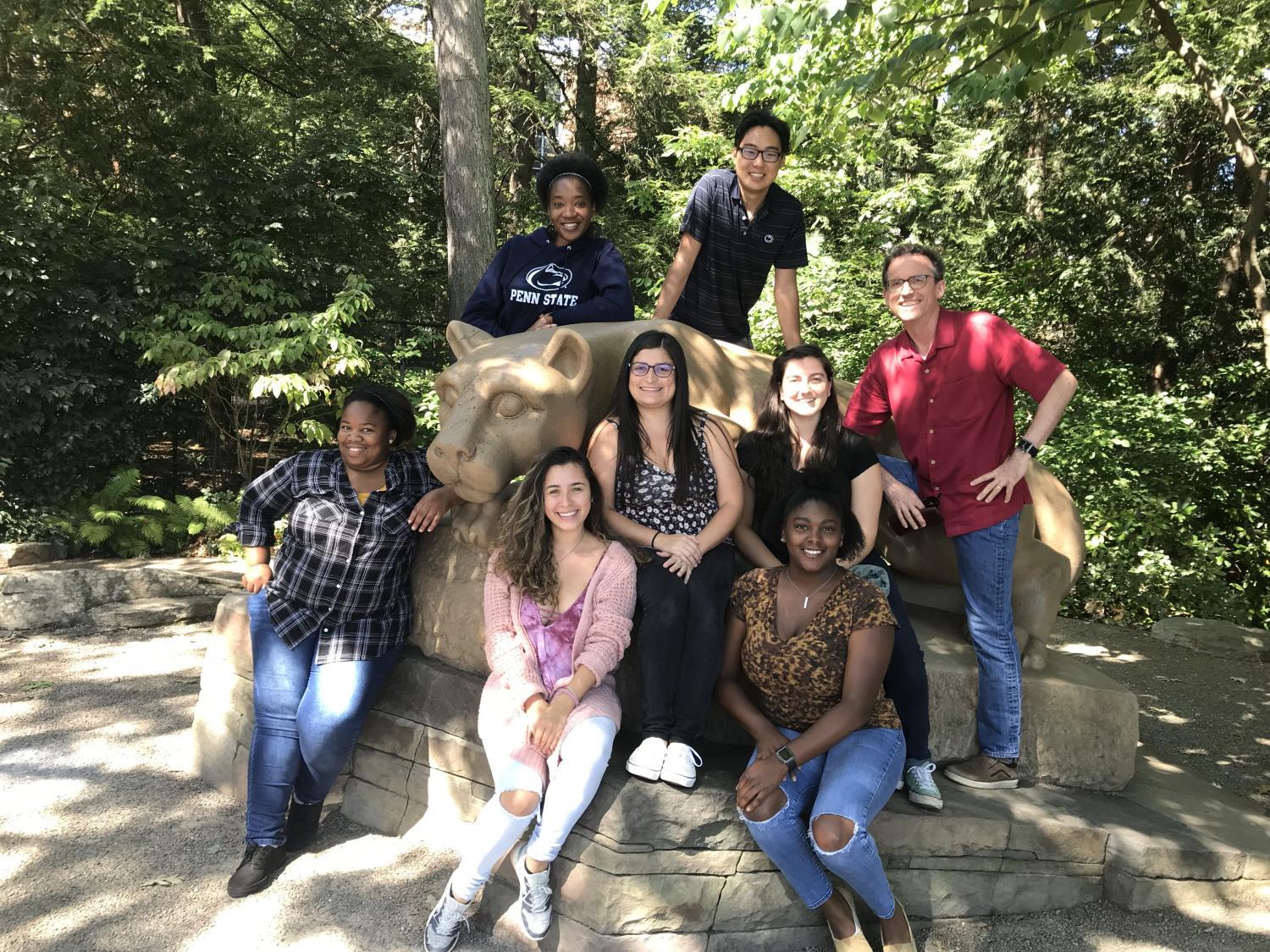University Park, Pennsylvania, USA
March 18, 2022
 Students from David Geiser’s lab in the Department of Plant Pathology and Environmental Microbiology visited the Nittany Lion Shrine in July 2019. From left, back row, are Benedicta Swalarsk-Parry and Shawn Chang. In the middle row are Jane Ramaswe, Terry Torres Cruz, Emma Wallace and David Geiser. In front are Daniela Chacon and Chyanna McGee. Ramaswe and Swalarsk-Parry were part of a student exchange program with the University of Pretoria’s Department of Biochemistry, Genetics and Microbiology. Credit: Penn State / Penn State.
Students from David Geiser’s lab in the Department of Plant Pathology and Environmental Microbiology visited the Nittany Lion Shrine in July 2019. From left, back row, are Benedicta Swalarsk-Parry and Shawn Chang. In the middle row are Jane Ramaswe, Terry Torres Cruz, Emma Wallace and David Geiser. In front are Daniela Chacon and Chyanna McGee. Ramaswe and Swalarsk-Parry were part of a student exchange program with the University of Pretoria’s Department of Biochemistry, Genetics and Microbiology. Credit: Penn State / Penn State.
Developing solutions to address threats to plant health is the centerpiece of a partnership between Penn State’s College of Agricultural Sciences and the University of Pretoria in South Africa.
“Penn State and the University of Pretoria both are working at world-class levels, so working together is mutually beneficial for research, education and outreach,” said Carolee Bull, head of the Department of Plant Pathology and Environmental Microbiology at Penn State. “We bring out the best in each other with a shared vision of improving the health of plants, and by extension, all of society.”
The formal arrangement grew from earlier research collaborations between the faculty from Pretoria and plant pathologists at Penn State, including one with Penn State’s Fusarium Research Center, directed by David Geiser, professor of mycology, and Brenda Wingfield, professor of genetics at Pretoria. Their work led to Wingfield spending a sabbatical at Penn State.
“We have impressive research facilities, but it is important for our students and faculty to have exposure to other top-class research laboratories and facilities,” said Wingfield, who has been named an adjunct professor at Penn State. “Our Penn State colleagues provided this for us. Our students and young staff can bring what they have learned in the U.S. to South Africa and expand our knowledge base.”
With support from Dean Rick Roush and College of Agricultural Sciences leadership, Bull and Deanna Behring, assistant dean for international programs and director of Ag Sciences Global, have shepherded a formal partnership with Pretoria.
The partnership is designed to increase both organizations’ research, teaching and extension impact and growth opportunities, thereby increasing food security and environmental stewardship.
“Building international relationships is critical to providing answers for long-term, sustainable solutions to challenges we all face,” Behring said. “In this case, Penn State and the University of Pretoria are known for high-caliber research and education, and by leveraging each other’s strengths in plant science, we are supporting food security and healthy communities.”
Additionally, Behring said collaborative relationships such as the one with Pretoria help to advance the United Nation’s Sustainable Development Goals, a collection of 17 interlinked global goals designed to be a “blueprint to achieve a better and more sustainable future for all.”
Thus far, student and faculty exchanges between Penn State and Pretoria have resulted in joint research projects on fungal and bacterial taxonomy; fungal genome editing; diseases of mushrooms, wheat and onions; wheat pathogens; and seed microbiomes.
Current Penn State faculty involved are Bull; Geiser; Terrence Bell, assistant professor of phytobiomes; Paul Esker, associate professor of epidemiology and field crop pathology; Beth Gugino, professor of vegetable pathology; David Beyer, professor of mushrooms; and John Pecchia, associate research professor and director of the Mushroom Research Center.
Before the pandemic, Bull and two graduate students from the Geiser lab, Terry Torres-Cruz and Emma Wallace, attended the Southern Africa Society of Plant Pathology’s annual meeting in Langebaan, South Africa, and presented their work.
Conversely, Thulani Makhalanyane, deputy director of the Center for Microbial Ecology and Genomics at Pretoria, visited Penn State. He engaged with plant pathology faculty and those at the Penn State Microbiome Center in the Huck Institutes of the Life Sciences.
At around the same time, graduate students Jane Ramaswe and Benedicta Swalarsk-Parry from Pretoria’s Department of Biochemistry, Genetics and Microbiology spent a fall semester working in the Geiser lab.
The universities continued their exchange during the pandemic through virtual seminars and student committee meetings. Moving forward, Bull and Wingfield anticipate the return of in-person interactions and conferences, with sabbatical visits from Pretoria faculty planned for 2023 at Penn State.
“We are enthusiastic about working with Pretoria and the discoveries being made,” said Bull, who recently was appointed a faculty affiliate at Pretoria. “Anytime we can partner with institutions that aspire to make advancements for the good of the world, it’s a win-win.”